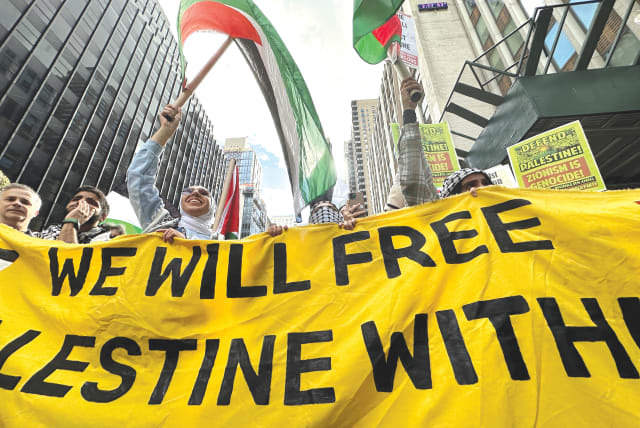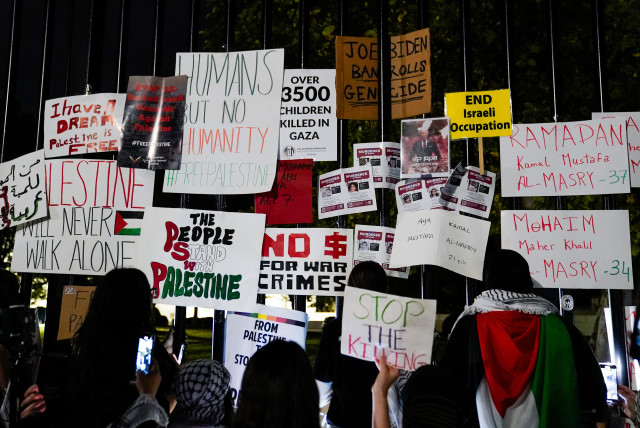The dual challenge behind Israel's public diplomacy campaign - opinion

Having said that, hasbara faces a dual challenge: a shortage of means and lack of explicable policy. Israel’s policy is not always clear and not everything can be explained.
A common reaction to criticism of Israel is: “Where is the hasbara? Why isn’t anyone doing hasbara? It is all hasbara’s fault!” Hasbara is Hebrew for “explanation.” Here it means a cross between public advocacy and information (and a dictionary added “propaganda”).
Having said that, hasbara faces a dual challenge: a shortage of means and lack of explicable policy. Israel’s policy is not always clear and not everything can be explained. And what can, requires resources, meaning personnel and money.
Along with antisemitism rearing its ugly global head since October 7, there are also many Arab and Muslim people and countries using their money and influence against Israel.
Let me start with who does hasbara. For years, Foreign Ministry budgets have been regularly slashed. Take what is considered the periphery of diplomatic activity. In the past, experts on development (water, agriculture, etc.) were an integral part of Israel’s diplomatic staff in Asia, Africa, and Latin America. No more. Israel often sent cultural attaches abroad, to introduce Israel’s culture and science to their host country. Shai Agnon’s Nobel Prize in literature was promoted by Yehuda Ya’ari, a prize-winning Israeli author who was posted to Sweden as a cultural attache. Now the task is usually just one of the many responsibilities of a junior diplomat or falls to an available spouse of an emissary.
That pales in comparison with the closure of diplomatic missions and ongoing cuts to staff and to operating budgets, forcing many missions to deal with several countries on a shoestring. Thus, Israel has diplomatic relations with 42 of the 48 countries in sub-Saharan Africa, a quarter of UN member states. These relations are conducted out of 11 embassies, less than a third of the number Israel maintained at the peak of relations in the continent, and more importantly – about half the number of offices that the Palestinian Authority (PA) currently has in the region.
Many missions, including consulates-general in the United States, which are responsible for an average of five states (with tens of millions of people, media, academia, and Jewish communities) are staffed by two diplomats, one of them also in charge of consular and administrative activities.
But if unofficial players such as Jewish organizations or social media influencers can fill some of the aforementioned gaps, they are not trained for “what needs explaining.”
I will avoid the ongoing situation, which is still playing out among high emotions, and resort to the topic which for decades has been at the center of international attention regarding Israel, the future of the territories it has controlled since the Six Day War in 1967.
For argument’s sake, let us assume that some have been convinced by the severest criticism of the Palestinians’ motives and of those of their leaders. They will nevertheless want to know: What is Israel’s long-term plan regarding the territories? How does entrenching a civilian presence (not to be confused with security/military feet on the ground) serve those goals?
Do you intend to annex?
If so, do you intend for the locals to have full rights, resulting in an Arab majority between the river and the sea, and with it – an end to the Jewish state? No? Oh, so you plan to annex without granting rights? In that case, you will be responsible for institutionalized discrimination, which you as Jews know so well. How do you expect the world to react? What are your plans to deal with the presumed international response?
The problems with the public diplomacy campaign
The only consistent answer I know to those questions is provided by religion. Whoever shares a belief in our holy books, meaning some Jews and Christians will be persuaded: the Land was promised to us, and that is that. But there is no point in using arguments from a private and subjective value system in a discussion with those who do not share it. Hence the need for agreed rules, such as international law. After almost 57 years, Israel provides no objective response to those most basic of questions. The person entrusted with hasbara is wordless.
Moreover, cabinet ministers and senior officials normally voice opinions on their areas of responsibility. But in Israel, many make policy statements on defense and foreign affairs. The diplomat, or whoever attempts to help Israel’s image, and already carries an impossible burden, is obligated to explain assorted declarations which target the speaker’s political base, and ignore global consequences.
Unfortunately, there are difficult circumstances beyond Israel’s control, which damage and undermine its international situation. These have grown monstrously in recent months. But whoever imagines that hasbara is a magic pill, take two a day and all will be well, is advised to examine the tools which Israel provides to those whose job it is to explain, as well as the obstacles it places before them.
The writer was Israel’s first ambassador to the Baltic states after the disintegration of the Soviet Union, ambassador to South Africa, and congressional liaison officer at the embassy in Washington. She is a graduate of Israel’s National Defense College.
Jerusalem Post Store
`; document.getElementById("linkPremium").innerHTML = cont; var divWithLink = document.getElementById("premium-link"); if (divWithLink !== null && divWithLink !== 'undefined') { divWithLink.style.border = "solid 1px #cb0f3e"; divWithLink.style.textAlign = "center"; divWithLink.style.marginBottom = "15px"; divWithLink.style.marginTop = "15px"; divWithLink.style.width = "100%"; divWithLink.style.backgroundColor = "#122952"; divWithLink.style.color = "#ffffff"; divWithLink.style.lineHeight = "1.5"; } } (function (v, i) { });

